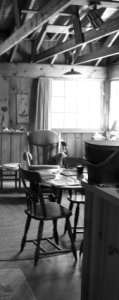Coming Home
November 2, 2014Podcast: Download (1.8MB)
Subscribe: More
 1.
1.
It happens with the simplest gestures:
a door swung open,
a light turned on in the hall,
the snap of a lock as it opens
somewhere unseen inside.
All of a sudden the world
turns inside out—
or rather, outside in—
and I can’t remember
what it means to be a stranger.
2.
“It takes a heap of living
to make a house a home.”
Perhaps. But we know
that homes are built
not just by living, but by building.
Homes are built by tricky choices
when you cannot see the result
and must imagine.
Homes are built by days
of patient effort, painting
stroke after stroke
until the color shows pure.
Homes are built by rebuilding
the ceiling when the ceiling falls,
stripping away old layers
‘til the wood comes through,
trusting that when you
connect the wires the electricity
will flow through after all.
Homes are also built by
slow minutes curled together
on the couch just looking.
3.
How to judge a house:
Are the foundations firm?
Is the structure sound?
Can you live with the neighbors?
Will you stay warm through the winters?
When you enter, are you captivated
by the quality of light?
The Challenge of Unitarian Universalist Theology
September 1, 2014Podcast: Download (15.5MB)
Subscribe: More
Some among us are asking, “Is there a center to Unitarian Universalism?” Or is it like the old story of blind persons describing an elephant, with a twist:
One of us touches the side and says, “It’s a wall.” Another feels the leg and says, “It’s a tree.” Another grabs the tail and proclaims, “It’s a rope.” But after all our surveying, is the one thing UUs can say for certain only that There is no elephant?
Do we have a theological center? And why are we asking about this? When did pluralism become a problem?
In Translation
September 1, 2014Podcast: Download (15.8MB)
Subscribe: More
We are people of the word. Or, better said, people of words, many words. Words are one of the most important ways that we “know” things.
But words, to quote Henry Adams, are “slippery things,” and words mean different things to different people. Take the word “freedom.” To the privileged early Unitarians, freedom meant freedom of thought. To the African American community, however, it meant freedom from slavery and freedom from oppression. The two groups had a hard time talking.
Saved
September 1, 2014I am paid to evangelize, to grow current congregations and plant new congregations. I’ve been lurking on internet sites of fundamentalist evangelists, because, quite frankly, they have systems for planting new congregations. I mean, they’ve got systems! They have trainings and boot camps and coaches and conferences just for planting. I have a hot case of holy envy.
So I thought about attending such a conference as an add-on activity in a city where I was already working on behalf of our Association. Well, attending it didn’t work out, but on the plane back home guess who my seatmates were? That’s right, two fundamentalist, evangelical men who had been to the church planting conference.
I strained my ears to hear what they were saying. The older man seemed to be in charge, and the younger one deferred to him. The elder quoted scripture and talked a lot about saving people. Their whole mission is converting people to Christianity so they may be saved and get into heaven.
I wanted to jump in, interrupt with all of the questions I had for them.
From Your Minister – September 2014
September 1, 2014Podcast: Download (8.1MB)
Subscribe: More
One of the ways that we create spiritual or theological common ground is so simple it’s almost embarrassing: We agree to do so. We make a commitment to each other to create a space that is held in common. In religious language, these commitments are called covenants. In the Bible, covenants are between people and God.
Covenants, if they are to truly hold us, need to be large enough to contain the whole selves of the people who make them (including both what is holy and what is unholy). The place we are most likely to see covenants being created is at weddings. Two people commit to one another before their loved ones and what they name as holy. I have seen people make some pretty unlikely promises over the years—promises that are romantic and beautiful, but in my mind fairly unsustainable.
We Covenant
September 1, 2014Podcast: Download (1.7MB)
Subscribe: More
Covenants are intentional.
Covenants are audacious.
Covenants are a promise
that can change our lives
together in this faith. Read more →
REsources for Living
September 1, 2014Podcast: Download (6.0MB)
Subscribe: More
As someone who grew up Unitarian Universalist, I have to admit that there are some disadvantages to being a UU kid. There are advantages, of course, like being able to celebrate holidays from a variety of different religions, but there are definitely drawbacks. Mostly these problems come when someone asks you, on the playground maybe, what church you go to. It’s hard enough just getting people through the ten syllables of Unitarian Universalist. But if you manage that task then the inevitable follow-up question is: “What do you believe?”
I happen to think that’s kind of an unfair question, especially to put on, say, a fourth-grader. If you say you’re Methodist or Baptist or Jewish nobody asks you what you believe. They have a category in their head to put you into, and they just leave it at that. Now, their assumptions about what you believe might be totally wrong, and I’m sure there is not one nine-year-old in 100 who could tell you the difference between what a Presbyterian and an Episcopalian believes, but the point is that no one feels they need to ask.
But if you’re UU there’s not only the long, awkward name to get through, there’s also the uncomfortable fact that people don’t know what mental box to put you in, so they ask about what you believe. Which leads you to the equally uncomfortable fact that your religion doesn’t tell you what to believe, which really messes with people’s idea of religion in general. And beyond even that, if you’re going to actually answer the question then you need to have figured out for yourself what it is that you believe, and how to say it, which is hard enough for a grown-up, and a real uphill climb for a child.
A Great Need
September 1, 2014Reintegration
March 8, 2013Remember the saying about how long it takes to get over a break up? What is it, something like divide the time you were together in two? So, if you were dating for a year, it should take about six months to get over the person.
Wouldn’t it be nice if life worked that way? Well, realistically, anyone who has been through a bad break up knows that these equations just don’t work.
What if we applied the same equation to a deployment? It should have taken three months for things to be back to normal after my wife got home, right? Not so much.
It’s funny, you know. People talk about the “new normal” after a deployment. Military families are taught about the adjustments and sacrifices that everyone makes during a deployment. We talk about how to make that “reintegration period” smoother.
Even with my counseling background and knowledge about how people grow and change over time, I can’t say that I was fully prepared for the changes we’ve been through since my wife deployed. Yes, it’s true that there is some readjustment back to daily life. Things like walking the dogs, taking out the trash, and cooking are all a bit different. Yes, that is a change that happens during a deployment. But the reality is that this deployment changed each of us – and it changed “us.”
I consider myself a pretty patient person. I am a good listener, and I take the time to support the people I love. But my level of patience deteriorated while Sue was deployed. It became a chore for me to listen to people complain about mundane things. Didn’t they know that I was worried about the love of my life being hurt or killed? How could they complain about traffic or have a long, deep conversation about reality T.V.? Some of that has subsided since she came home, but some of it has not. And perhaps the hardest part of that for me is that I was completely unaware it was happening. I didn’t realize that my patience was waning and my anger was rising.
Susan has had trouble adjusting home with regard to patience as well. It’s difficult to come home and have people assume that things are just going to go back to normal. It’s challenging to go back to a civilian desk job after your mind and body have been going 100 m.p.h. for so long. It’s hard to trust the people at your civilian job to have your back, the way your military comrades do, when in all reality they often don’t. It’s hard to have patience with people as they ask awkward questions about your deployment or, perhaps even more difficult, when they don’t.
It has been four months since Susan got home from her deployment. We are still in the “reintegration phase.” Sometimes I wonder what things will look like down the road. Will I ever fully regain my patience? Will she readjust to work? Will the people around us ever fully understand what we’ve been through?
I’m unsure of many of those answers. What I am sure of, though, is that I am thankful to have a different perspective when I am stuck in traffic or get the wrong coffee in my order – this deployment helped with that. I am sure that the level of connection and camaraderie that Susan felt during her deployment is possible in the civilian world, if only we have people like her to help make it so. And, finally, I am sure that the people in our life who love and care about us just want to understand. They want to know how we got through such a challenging time, and how we continue to learn and grow from it.
To be honest, I want to understand too.
Belonging as a Military Spouse
October 10, 2012September 20, 2012 was the one-year anniversary of the repeal of Don’t Ask, Don’t Tell. This discriminatory policy prevented gay, lesbian, and bisexual service members from serving openly in the American military. This meant that for the first few years I was with my spouse, she couldn’t speak openly about me or our relationship. She went to military functions alone, didn’t attend family events on base, or talk with her fellow service members about her personal life.
This also meant that when we married in June of 2011, she was at risk of being discharged simply for marrying the person she loves. Fortunately, the repeal went through, and now she can serve openly.
Support the CLF
Can you give $5 or more to sustain the ministries of the Church of the Larger Fellowship?
If preferred, you can text amount to give to 84-321
Newsletter Signup
About
Quest for Meaning is a program of the Church of the Larger Fellowship (CLF).
As a Unitarian Universalist congregation with no geographical boundary, the CLF creates global spiritual community, rooted in profound love, which cultivates wonder, imagination, and the courage to act.
Contact
Church of the Larger Fellowship Unitarian Universalist (CLFUU)
24 Farnsworth Street
Boston MA 02210




